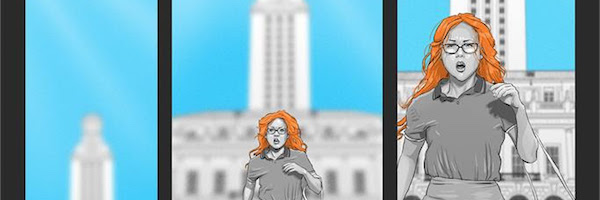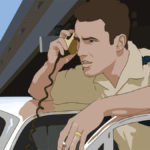Such is the awesome humanity and dignity of Keith Maitland‘s animated documentary Tower, I wept buckets.
It is actually a combination of archive footage, rotoscopic animation and interviews recreating and remembering the events of 1 August 1966 at the University of Texas, Austin, where 15 people were killed by sniper Charles Whitman from the tower, a man who had already that day killed his wife and mother and whose shooting was stopped only when killed by two policemen, aided by one civilian with a rifle. In addition, nearly three dozen were wounded in the attack. The shock waves extended across the nation.
While the words of many witnesses then and now contribute with extraordinary power to the detailed narrative of how they felt at the time and the impact on their lives since, the main focus is on Claire Wilson, a heavily pregnant and happy 18 year old in love with Thomas Eckman. Wilson was shot and seriously injured in the attack, but her baby and her lover were both killed.
The bravery of the late Rita Starpattern, who ran out, lay with Wilson on the hot concrete on a burning hot day and stopped her slipping into unconsciousness, is highlighted in the film. In such moments are heroes made, people who step into the limelight at great personal risk, though until the moment arises we have no way of knowing if we would be paralysed by fear or follow instinct and risk death to help out others.
While death is ever-present in the film, it is never glorified – indeed, the animated blood stains are and corpses are mostly shown in grey, for the film is about the courage and feelings of the survivors and the police who went beyond the call of duty.
Paradoxically, the animation conveys far more about the people portrayed than you would thought possible, emphasising their feelings in a way parallel to but unique from that achieved in the stop-motion Anomalisa. The hand-coloured drawings highlight the geography, the people, their predicament, their moods and fears, by embroidering on reality and showing angles a camera could never reach, so much more than a straight recreation could deliver.
Maitland’s film avoids over-politicisation, restraining itself to a few comments at the end about further mass shootings to demonstrate that whatever the anguish about the 1966 deaths it did not stop the spate of killings, nor did it enable access to guns to be controlled at the alter of the 2nd amendment. However, Maitland’s point is gently made; that the US has trained mass killers, including many thousands sent to Vietnam and other war zones ever since, but has not provided the care to ensure they do not go off the rails.
This is a towering and inspirational achievement I urge everyone to see. Coming in at 82 minutes, it demonstrates precisely that great things can be achieved without padding out time to regulation length. Each shot is precisely judged and delivered to fit the message, and without needless emoting. The emotion is in the fate of the survivors, as it rightly should be. I sincerely hope it is rewarded with gongs.









